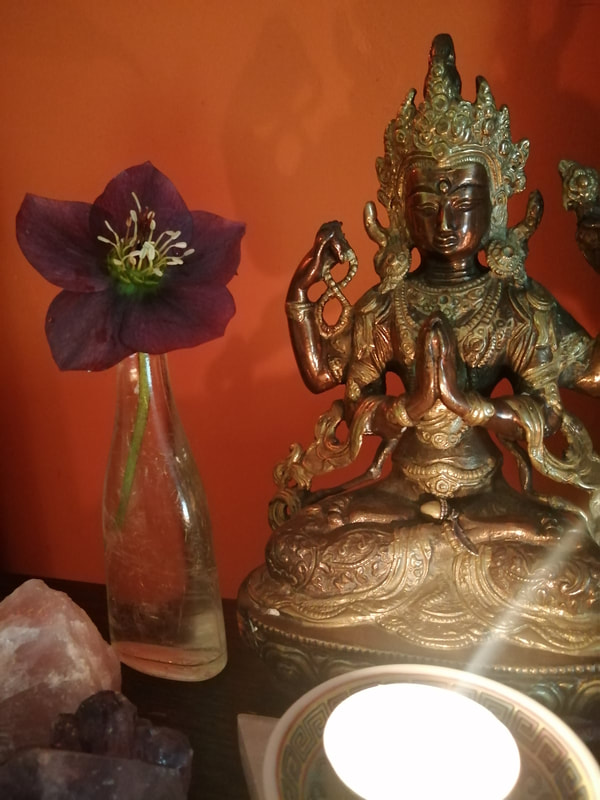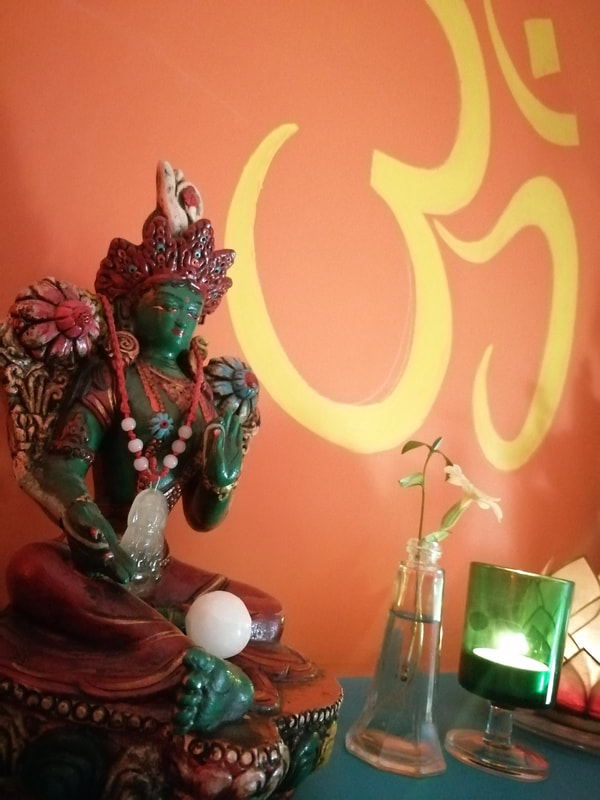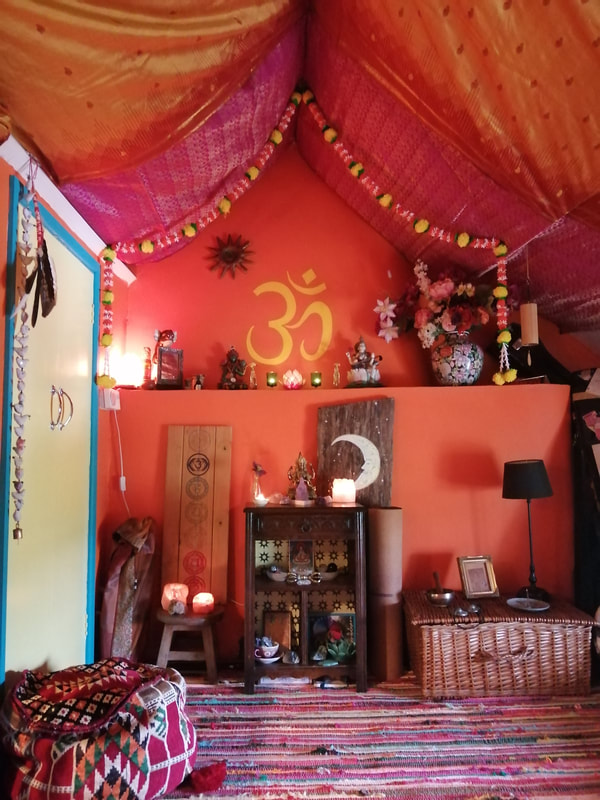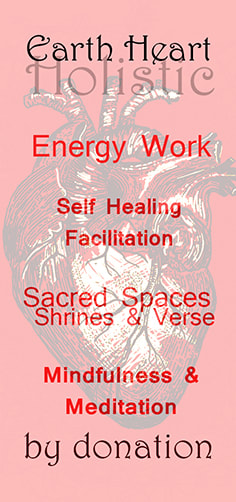I once gave a talk called "Why I Meditate." I'm tempted to title this "Why I don't Meditate". But it's not as straightforward as that.
| When I first launched this project, I very deliberately stated that amongst other things it would be a space to reflect on my meditation practice with the clear intention of holding myself accountable for actually meditating. After six years, I recently left the residential community of Taraloka Buddhist Retreat Centre, where the daily structure presupposes a 45 minute shared meditation session at seven every (OK, nearly every) morning. I'm not sure how many times during my six month leaving process I said something like "I can't wait to find out what my practice looks like when it's not dictated by the community timetable!" and I certainly never imagined that I would maintain that particular 'first thing' routine, but I never once said "Phew, I'll never have to meditate again come January!" So this article is by way of a lengthy ramble around what my meditation practice looks like when I'm not choosing to fit it into a pre-existing routine. At least, it's what it's looking like at the moment and I know very well that moments are vague, shifting benchmarks... Anyway, this is a bit more complicated than a vaguely photographic excuse for a recipe and has required significantly more consideration. It's also a longer read, grab a cuppa... |
First, maybe I'll catch you up on a bit of historical context. I learnt to meditate a tickle over nine years ago, in March 2015, when I was signed off sick from and about to leave arts teaching. I was anxious, unhappy and unwell. I actually went to a drop in class intending to prove to a friend that meditation wouldn't help me without looking too closed minded to try. Well, that kinda backfired and just a few weeks later, not only had I learned meditation could indeed help me, I'd found it could completely transform my life and subsequently realised I was a Buddhist. Being an 'all or nothing' kind of person with a taste for intensity, I promptly spent six months in India living in a Buddhist community and teaching some very oppressed and abused young people before returning to the UK, requesting ordination and deciding to live in the middle of nowhere (rural Shropshire) to be on a team of women running a retreat centre. Oh yeah. That's why I decided it was time for a rest. (Did the kettle boil yet!?)
So, you may well wonder, how did all that happen? How did all that unfold from the simple act of walking into a drop in meditation class one grey Wednesday lunchtime in Manchester? Did I have a third-eye opening experience of transcendent bliss on the spot? Hell, no. The only thing I honestly remember about that first session is that I spent most of my time alternating between wondering why I was there and what I was going to do when the class finished. Also that my legs were aching from too much running. Actually that was almost certainly the longest I'd sat down all week. If you want a more detailed back story, I gave this aforementioned talk (Why I Meditate) a little while back but basically I realised I really needed to stop. I wasn't sure what it was exactly that I needed to stop but I knew I had to stop it and I knew I had to do something different. Slowly but surely, regular, short meditation helped me create a small but significant window of time between one thought and the next where I could notice the constant inner monologue of anxiety but choose not to be defined by it. I learned that from these spaces I could choose to open more to others. I started to feel more connected to the world around me, less fearful and less alienated. I even began to heal my very fractured relationship with my own body by finally consenting to investigate what it really felt like to have one. For the first time in my adult life I bothered to explore what it feels like to have toes.
So, you may well wonder, how did all that happen? How did all that unfold from the simple act of walking into a drop in meditation class one grey Wednesday lunchtime in Manchester? Did I have a third-eye opening experience of transcendent bliss on the spot? Hell, no. The only thing I honestly remember about that first session is that I spent most of my time alternating between wondering why I was there and what I was going to do when the class finished. Also that my legs were aching from too much running. Actually that was almost certainly the longest I'd sat down all week. If you want a more detailed back story, I gave this aforementioned talk (Why I Meditate) a little while back but basically I realised I really needed to stop. I wasn't sure what it was exactly that I needed to stop but I knew I had to stop it and I knew I had to do something different. Slowly but surely, regular, short meditation helped me create a small but significant window of time between one thought and the next where I could notice the constant inner monologue of anxiety but choose not to be defined by it. I learned that from these spaces I could choose to open more to others. I started to feel more connected to the world around me, less fearful and less alienated. I even began to heal my very fractured relationship with my own body by finally consenting to investigate what it really felt like to have one. For the first time in my adult life I bothered to explore what it feels like to have toes.
| So yes, the results of meditation were undeniably extremely valuable to me and though it was slow work in some respects, I very quickly began to enjoy the fruits of my labour. That is to say, it's not often that I especially enjoy the actual meditation. Sure, I've had some very pleasurable meditation experiences but mostly it's been at least fairly challenging if not down right hard work. There have been times it was all I could do to stay on my cushion for the sheer intensity of all the experience I'd spent most of my life studiously ignoring via a range of entirely socially acceptable ways of being completely and permanently distracted. And I like intensity! But this was no more enjoyable than 15 miles of marathon training on a treadmill. Yes. I have. That was one of distraction techniques. But exactly like fitness training, you don't do it for the work out, you do it for the effects of the work out. I never meditated because half an hour of trauma processing and flooding myself with years (and tears) of built up grief was pleasant. I meditated because the rest of my life around the meditation was far less unpleasant than when I didn't. |
Ah yes. Stored trauma. Body work (I'm talking yoga, Tai Chi, other somatic practices) have also played an essential part of the story to the extent that I can't easily separate my formal sitting meditation experiences from those I often meet during yoga practice anymore. And that these apparently physical practices have a therapeutic effect on the mind is no longer the sole assertion of the new age hippy or the martial artist, it's backed up by medical doctors and trauma specialist psychologists who are extremely well respected in their fields. (Gabor Maté, Bessel van der Kolk and Pete Walker are some of my favourites)
But before we lose ourselves in the secular and psychological, let's come back to basics... What really is Meditation and have I been doing it? Simple questions often belie complex answers but I'll have a bash at the first bit. Meditation can be thought of as:
A.) A tool for cultivating awareness,
B.) An exercise for developing compassion,
C.) A method for becoming fully embodied (hmm, that might actually just be A. Or is it B? Maybe it's both, never mind…)
D.) And, because I'm a Buddhist, I do believe it's an essential factor on the path to awakening. (Oh wait, that sounds like A as well. Or B? Hmm... This tangent might have to be explored in a separate, future post...)
The second bit is less complex; have I been doing it? Er, no. Not really... Hang on. It's just not as straightforward as that.
OK, well, let's unpick this and look at the first bit again. What is Meditation? Sometimes I have found it helpful to think of meditation as a kind of gym for the mind. I train my mind in meditation to focus and become aware; I get a more user friendly mind the rest of the time. And that's fine, as far as it goes in a secular, psychological kind of way. But it doesn't for a second do justice to the rich subtlety of consciousness that you can begin to access in meditative states and you may have gathered that my relationship to the gym hasn't always been healthy or helpful. Neither has it often been mindful or kindly.
So, some of my work of late has been in cultivating awareness of the all those same old subconscious yet unhelpful behaviour patterns trying to crystallise around my reasons to meditate and turn it into a bargaining chip in a transactional equation. If I carry out (X) behaviour then (Y) = I'm an acceptable human being. Y is pretty constant. X has variously manifested as academic success, fulfilment of socially normal activities, demonstration of creative skill, physical fitness, a particular sort of body shape, etc. The list is practically endless. To break that loop, I'm back to making the space to notice (awareness) that story telling itself somewhere in the depths of my mind but refusing to fuel it (I think that's the compassion bit kicking in). To me, meditation is about being creative, experimenting, doing something differently. It's about taking responsibility for myself, looking at the actual effect certain acts of body, speech and mind have on myself and those around me and making choices. What habits am I reinforcing? Are those habits helping me awaken? Are they even helping me live a happy, healthy life? And if the answer is 'no', then what? We all know old habits run deep and stubborn.
But before we lose ourselves in the secular and psychological, let's come back to basics... What really is Meditation and have I been doing it? Simple questions often belie complex answers but I'll have a bash at the first bit. Meditation can be thought of as:
A.) A tool for cultivating awareness,
B.) An exercise for developing compassion,
C.) A method for becoming fully embodied (hmm, that might actually just be A. Or is it B? Maybe it's both, never mind…)
D.) And, because I'm a Buddhist, I do believe it's an essential factor on the path to awakening. (Oh wait, that sounds like A as well. Or B? Hmm... This tangent might have to be explored in a separate, future post...)
The second bit is less complex; have I been doing it? Er, no. Not really... Hang on. It's just not as straightforward as that.
OK, well, let's unpick this and look at the first bit again. What is Meditation? Sometimes I have found it helpful to think of meditation as a kind of gym for the mind. I train my mind in meditation to focus and become aware; I get a more user friendly mind the rest of the time. And that's fine, as far as it goes in a secular, psychological kind of way. But it doesn't for a second do justice to the rich subtlety of consciousness that you can begin to access in meditative states and you may have gathered that my relationship to the gym hasn't always been healthy or helpful. Neither has it often been mindful or kindly.
So, some of my work of late has been in cultivating awareness of the all those same old subconscious yet unhelpful behaviour patterns trying to crystallise around my reasons to meditate and turn it into a bargaining chip in a transactional equation. If I carry out (X) behaviour then (Y) = I'm an acceptable human being. Y is pretty constant. X has variously manifested as academic success, fulfilment of socially normal activities, demonstration of creative skill, physical fitness, a particular sort of body shape, etc. The list is practically endless. To break that loop, I'm back to making the space to notice (awareness) that story telling itself somewhere in the depths of my mind but refusing to fuel it (I think that's the compassion bit kicking in). To me, meditation is about being creative, experimenting, doing something differently. It's about taking responsibility for myself, looking at the actual effect certain acts of body, speech and mind have on myself and those around me and making choices. What habits am I reinforcing? Are those habits helping me awaken? Are they even helping me live a happy, healthy life? And if the answer is 'no', then what? We all know old habits run deep and stubborn.
| One of my friends and teachers sometimes uses the wonderful analogy of the bendy drinking straw; it's pretty tricky to straighten a drinking straw from being bent in one direction without bending it into the opposite direction first. It's like a pendulum. To stop engaging in a behaviour, sometimes it's helpful to tactically take the opposite approach for a time. Having noticed my relationship with formal, disciplined sitting meditation leaning towards the formulaic and transactional. I'm now experimenting with letting it be totally OK to not meditate at all. Full stop. Ever again. I'm not meditating. And having completely identified over the last nine years with Being a Meditator, that's a scary business, especially now I've stated it publicly. But I've got to move away from the tick-box-to-do-list approach to meditation, because I think if that's how I'm approaching it, it might not really even be meditation anyway. Maybe that's a sweeping statement. Maybe it's just not being the meditation it has the potential to be. |
When I was in the process of leaving Taraloka, I could feel that my relationship with meditation had become pretty routine, that I was often sitting because 'I should', because I didn't want to appear to have checked out of community life too soon. But I was, and still am determined to allow a new, dynamic, potentially unstructured, living, breathing relationship to evolve. It's often been my experience that one must totally let go of one thing before a new one can arise. Of course, I'm still hugely benefitting from my years of formal practice and I have no intention of allowing myself to lose that or to back-slide but I've learned that meditation is cyclical and just like I know in my bones I'm a poet without having had to write a poem before breakfast, I am beginning to believe that I can trust my meditation practice to my intuition. I can work with my mind. It doesn't have to look a certain way.
If working with my mind doesn't currently look like meditation, what does it look like? I'm not sure that any meditative experience can be easily described, defined or pinned down but it's certainly not transactional and my sense of being an acceptable human being definitely doesn't depend on it. It's
much more subtle than that. It's free, it's wild, it's remembering to notice my experience in any moment, not 'doing my 45 minutes' then checking out. It's dropping into my body, my raw, current, felt what-is-actually-going-on-ness, in mundane moments. It's an honesty, an authenticity, a live news reel of paying attention in both painful and in pleasurable moments of daily life and holding myself responsible for some of that. It's requesting a conversation with the fullest breadth of this human experience I can manage and choosing to listen more than I speak. It's weaving with aspects of disciplined practice such as breath and compassion but not being limited by count-to-ten structure. It's suddenly realising at three o'clock in the afternoon that I really, really want to light the candles on my shrine now and rushing off to do so. Sometimes it's yoga and often it's chanting and maybe it's just sitting with my shrine, being slightly more in relationship with the OK-ness of not knowing. Content to simply be in this vast mystery of the universe.
Years ago in the ‘Why I Meditate’ talk, I stated and still believe that it's a radical thing to sit and do nothing (no, not even meditate) in our current social context of constant productivity and exponential economic growth. It's quite a thing to say 'I'm not doing', to sit (or stand, or lie, or walk, or dance, etc.) and just be.
So, whatever my current meditation practice is, or isn't, it's not regular, formal or disciplined. It would hugely undermine nearly a decade (eek!) of meditation experience to say despite saying all that I think I'm the closest I've ever got to actually meditating, but if I stop listening to all the little voices that like to tell me 'I'm not doing it right' I know full well it's a very significant and powerful development in my relationship with a consciousness that doesn't start with, end in or limit itself to what we normally call meditation. And I'm pretty happy with that.
If working with my mind doesn't currently look like meditation, what does it look like? I'm not sure that any meditative experience can be easily described, defined or pinned down but it's certainly not transactional and my sense of being an acceptable human being definitely doesn't depend on it. It's
much more subtle than that. It's free, it's wild, it's remembering to notice my experience in any moment, not 'doing my 45 minutes' then checking out. It's dropping into my body, my raw, current, felt what-is-actually-going-on-ness, in mundane moments. It's an honesty, an authenticity, a live news reel of paying attention in both painful and in pleasurable moments of daily life and holding myself responsible for some of that. It's requesting a conversation with the fullest breadth of this human experience I can manage and choosing to listen more than I speak. It's weaving with aspects of disciplined practice such as breath and compassion but not being limited by count-to-ten structure. It's suddenly realising at three o'clock in the afternoon that I really, really want to light the candles on my shrine now and rushing off to do so. Sometimes it's yoga and often it's chanting and maybe it's just sitting with my shrine, being slightly more in relationship with the OK-ness of not knowing. Content to simply be in this vast mystery of the universe.
Years ago in the ‘Why I Meditate’ talk, I stated and still believe that it's a radical thing to sit and do nothing (no, not even meditate) in our current social context of constant productivity and exponential economic growth. It's quite a thing to say 'I'm not doing', to sit (or stand, or lie, or walk, or dance, etc.) and just be.
So, whatever my current meditation practice is, or isn't, it's not regular, formal or disciplined. It would hugely undermine nearly a decade (eek!) of meditation experience to say despite saying all that I think I'm the closest I've ever got to actually meditating, but if I stop listening to all the little voices that like to tell me 'I'm not doing it right' I know full well it's a very significant and powerful development in my relationship with a consciousness that doesn't start with, end in or limit itself to what we normally call meditation. And I'm pretty happy with that.




 RSS Feed
RSS Feed
